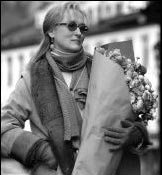EVER THE A STUDENT with her hand raised in the air (“I know the answer! Call on me, teacher!”), Meryl Streep stirs both envy and resentment from those of us in the back of the classroom. Over the years, since she began piling up Oscar nominations in the late ’70s (she has 12 to date), my reaction to her diligent, dutiful, well-studied performances has essentially been: Enough, Meryl—we get the idea. Couldn’t you occasionally skip the homework, the accent, the harrowed intensity of all these martyrlike roles? Couldn’t you occasionally relax from your sheer . . . Streepness and come out to the kegger with the regular kids?
It’s not that her acting isn’t great (she certainly deserved her Oscars for Kramer vs. Kramer and Sophie’s Choice), it just isn’t that fun to watch. She’s been too locked into that Katharine Hepburn thing, the Tradition of Quality thing, the Greatest Living Screen Actress thing, which she carries around like a set of encyclopedias.
So, apart from being a very fine film, The Hours was a pleasant surprise, Streep-wise. Since she shares the heavy lifting with Nicole Kidman and Julianne Moore in the overlapping, tripartite narrative, she’s freed from carrying the entire picture. Here, Streep becomes a normal New Yorker schlepping grocery bags to her West Village brownstone. She’s harried, late, a bit frumpy and frazzled. No accent, not so much trauma, a stable household with lesbian partner and college-age daughter—at last, she’s one of us.
Her acting seems both revelatory and unforced. One of her strongest scenes is played sitting on the floor of her kitchen, slumped against the dishwasher with nary a Nazi in sight. Ed Harris’ flamboyantly raging, dying poet gives Streep a chance to simply re-act, and she does it amazingly. Streep’s performance is that of a woman precisely, precariously balanced at the breaking point, and she makes that the drama of an everyday life.










